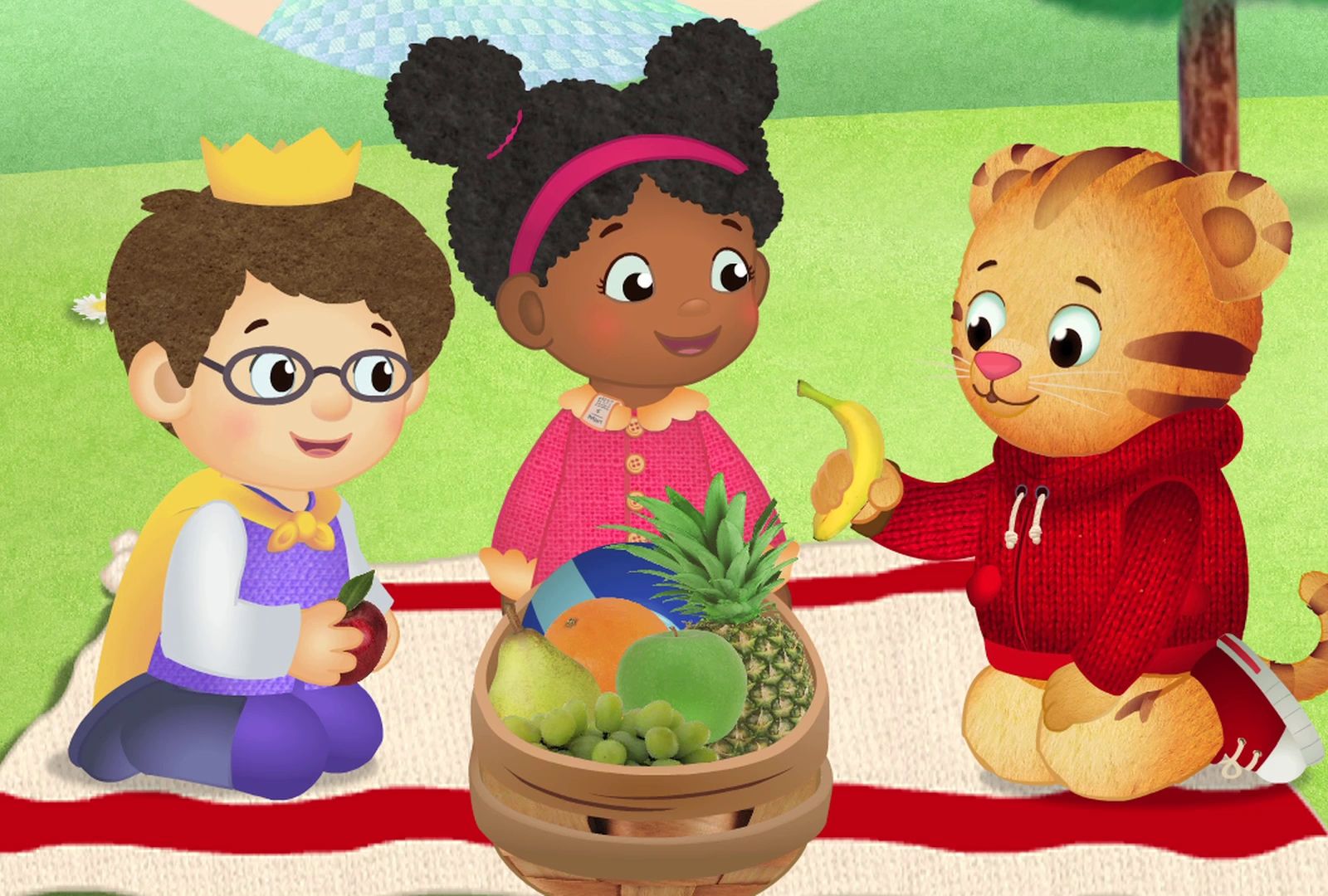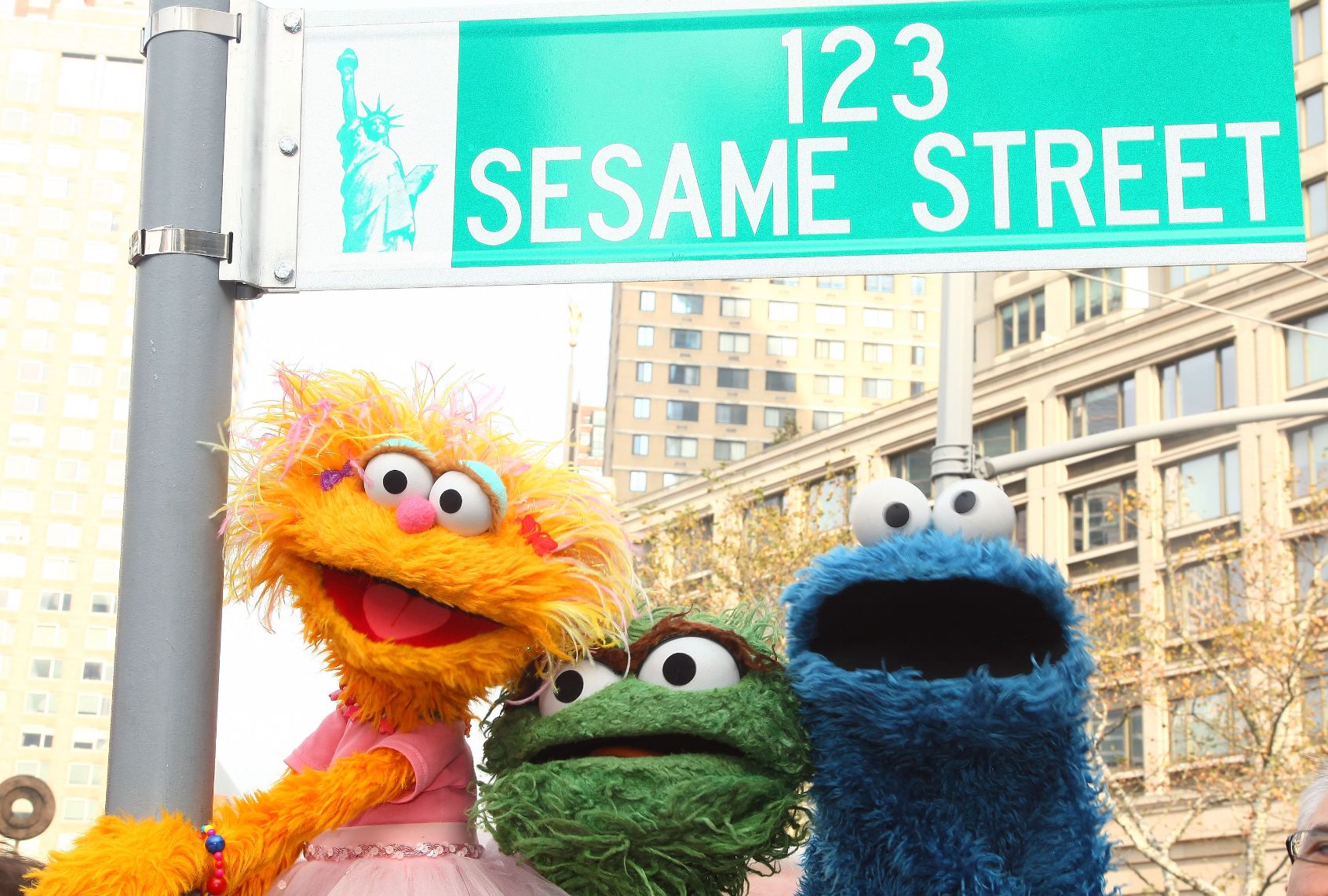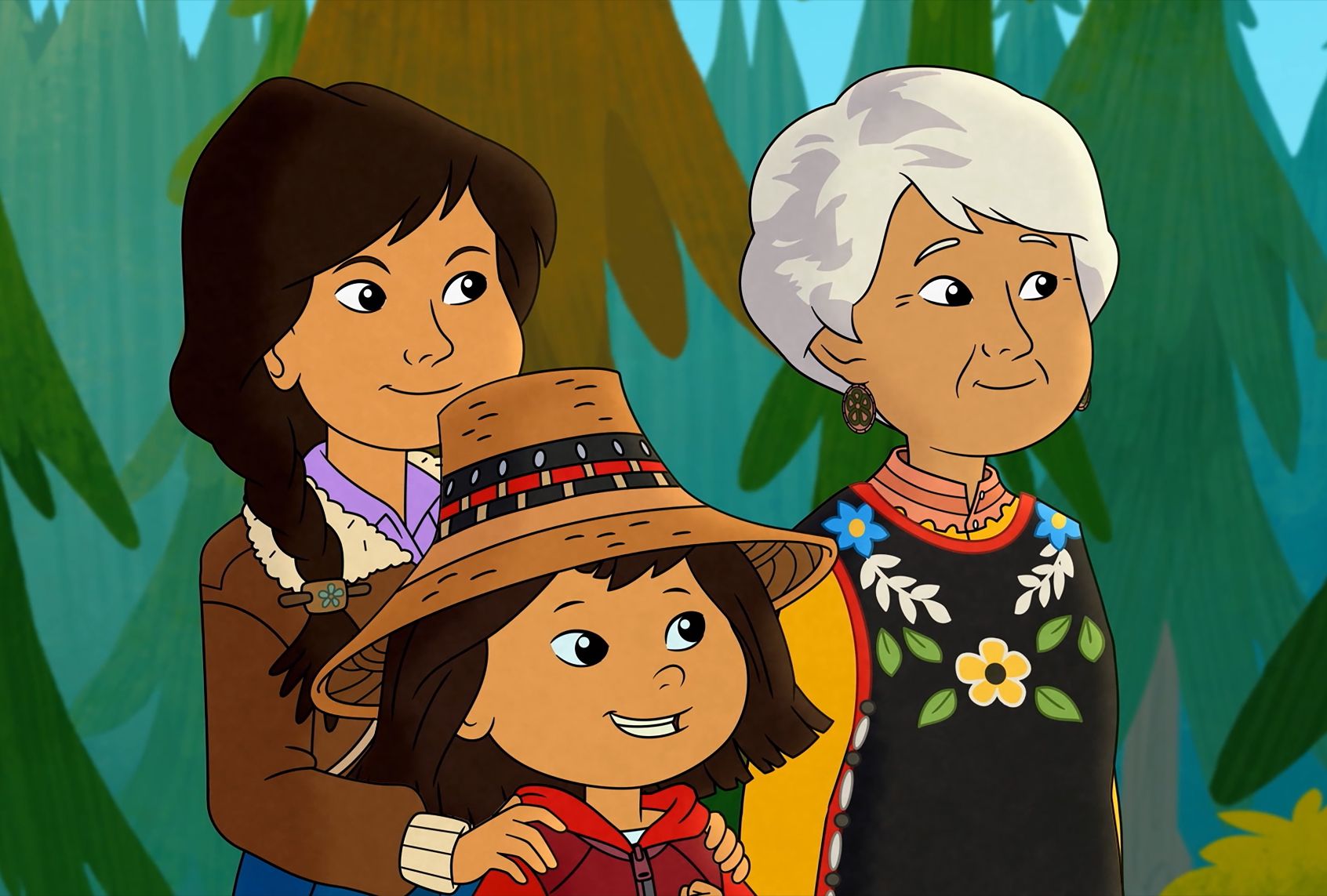For nearly 30 years, “Arthur” has taught young children about problem-solving and appreciating their peers’ differences. The show’s bespectacled title character is a gentle 8-year-old aardvark who spreads the joy of getting along with others. So if you haven’t been keeping up with current events, his militant stance in a recent social media post might have surprised you.
Shortly after President Donald Trump released his executive order calling on Congress to rescind $1.1 billion in federal funding for the Corporation for Public Broadcasting, an image of Arthur’s curled fist appeared on the show’s Instagram account under the heading, “When they come for PBS.”
An animated clip of Arthur’s sister D.W. on her bike followed a week later, exclaiming, “We ride at dawn for PBS . . . Who’s riding with us?”
To paraphrase one of the account’s followers, you know the situation is bad when Arthur is resorting to violence.
That commenter posted that in jest, but the underlying sentiment is accurate. This is as severe an existential crisis for the Public Broadcasting Service and National Public Radio as anyone raised on a children’s programming diet of “Arthur,” “Sesame Street” and other public TV shows has seen in our lifetimes.
You know the situation is bad when Arthur is resorting to violence.
Among the certainties of American life beyond death and taxes is the guarantee that any Republican administration will reopen hunting season on gentle PBS Kids characters. When former Utah senator Mitt Romney led the charge in 2012, he placed Big Bird in his sights. In 2005, Congress threatened to cut $100 million out of the CPB budget after an episode of “Postcards from Buster,” Arthur’s forebear, featured the child of a same-sex couple in Vermont.
Conservatives have been gunning for PBS since it began broadcasting in 1970, but they haven’t had the political means to succeed until now.
Trump’s executive order titled “Ending Taxpayer Subsidization of Biased Media” on May 1 followed March’s House Subcommittee on Delivering Government Efficiency hearing, chaired by Rep. Marjorie Taylor Greene, R-Ga. In that televised sideshow, Greene accused PBS of “sexualizing and grooming children.” As alleged proof, she held up a large glamour shot of a drag performer, Lil Miss Hot Mess, who was featured in an April 2021 segment for “Let’s Learn,” an educational show produced by the WNET group and the New York City Department of Education.
That segment only aired locally, but the photo made for an effective prop in this anti-inclusion political environment targeting the queer community, especially transgender people. Most of the hearing involved Greene and her GOP allies on the subcommittee denouncing PBS president and CEO Paula Kerger and NPR’s president and CEO Katherine Maher for allegedly peddling political bias.
The subcommittee’s Democrats countered with jokes about Elmo and other “Sesame Street” characters. Only Rep. Ro Khanna, D-Calif., referenced the popular PBS Kids series “Daniel Tiger’s Neighborhood,” with a purpose that laid bare the hypocrisy of his colleagues’ allegations.
In questioning Mike Gonzalez, a Heritage Foundation senior fellow supporting the far-right’s defunding calls, it became obvious that he has no idea what type of programming airs on PBS Kids or, for that matter, PBS in general.
Gonzalez couldn’t tell Khanna, for example, that “Daniel Tiger’s Neighborhood” is a spinoff of “Mister Rogers’ Neighborhood.” This is an odd detail to forget from the man who made the case for defunding public media in “Project 2025’s Mandate for Leadership: The Conservative Promise.” After calling defunding public media “good policy and good politics” in that document, Gonzalez declares that the content that runs on NPR and PBS is “noneducational.”
Anyone watching this travesty play out on Capitol Hill knows that these actions have nothing to do with protecting or nurturing kids. It’s about punishing the poor to score political points with the wealthy. A ProPublica report titled “The Trump Administration’s War on Children” lists the many ways this administration is failing children. Among them: Federal employees working for Child Protective Services have been dismissed. Proposed Medicaid cuts would cut access to health care in schools and foster care for lower and middle-income families.
In April, the administration withheld nearly $1 billion in federal grants to Head Start centers nationwide, a year-over-year decline of 37%, resulting in layoffs and regional office closures.
The MAGA attacks on public media are part of this assault. Public radio and TV level the informational playing field, and to an administration devoted to controlling what Americans learn and think, that is a problem.
 “Daniel Tiger’s Neighborhood” (PBS/The Fred Rogers Company)
“Daniel Tiger’s Neighborhood” (PBS/The Fred Rogers Company)
As Kerger has said many times, including in an interview the New York Times published Friday, half of the content PBS provides is for kids under the age of 5. That includes early learning material available for parents and educators on the PBS Kids website, which has been shown in studies to help children between 2 and 8 years of age make measurable progress in literacy and math. (Salon has also reached out to PBS to request an interview with Kerger.)
Conservatives have accused PBS and NPR of liberal bias in their news and documentary coverage since Richard Nixon was in office.
Since PBS reaches an estimated 99% of the country’s broadcast viewers, that gives every child free access to high-quality educational content. That accessibility may be one of the reasons that 43% of respondents to a recent Pew Research survey said NPR and PBS should continue to receive federal funding. This includes Democrats and Republicans. (33% say they are not sure.)
The conservative argument for cutting taxpayer funds to the Corporation for Public Broadcasting hasn’t changed much over the years, even down to the scapegoats. There is always the question of what public media is doing that isn’t being accomplished on cable and, now, streaming services and podcasts. Usually, the Heritage Foundation has led the chorus asking some version of this query.
So when Gonzalez wrote in his Project 2025 entry, “Unlike in 1967, when the CPB was established, today the media landscape is filled with abundant, diverse, and innovative news options,” he wasn’t saying anything many others haven’t said before.
We need your help to stay independent
Conservatives have accused PBS and NPR of liberal bias in their news and documentary coverage since Richard Nixon was in office. But they seem to take a special pleasure in using PBS’ children’s programming as a political wedge.
If PBS were denied taxpayer money, wouldn’t cable programming on Nick Jr., Disney, and content streaming services like Netflix, Paramount+ and HBO Max fill their absence? Aren’t toddlers turning to influencers like Ms. Rachel on YouTube more than, say, “Alma’s Way” on PBS?
Besides, isn’t HBO producing “Sesame Street” these days? (In short, no.)
 Sesame Street’s Zoe, Oscar the Grouch and Cookie Monster under a “123 Sesame Street” sign at the “Sesame Street” 40th Anniversary temporary street renaming in Dante Park on November 9, 2009 in New York City (Astrid Stawiarz/Getty Images)
Sesame Street’s Zoe, Oscar the Grouch and Cookie Monster under a “123 Sesame Street” sign at the “Sesame Street” 40th Anniversary temporary street renaming in Dante Park on November 9, 2009 in New York City (Astrid Stawiarz/Getty Images)
These presumptions are continuations of the decades-old insistence that public media should be privatized. They also reveal a general lack of knowledge about how public media works, to say nothing of the examples playing out in the news that illustrate why billionaire media owners cannot be trusted to refrain from interfering with their outlets’ editorial decisions.
The CPB is independent of the government, established by Congress in the Public Broadcasting Act of 1967 as a private, nonprofit corporation. It does not produce programming or own, operate, or control any public broadcasting stations, its mission states. This is to ensure the editorial independence of member stations and shield PBS, NPR, and local producing stations like WGBH and WNET from political pressure.
Federal dollars flowing to PBS through the CPB amount to around 15% of the broadcast service’s overall funding, most of which goes to its more than 330 member stations, which pay licensing fees for programming and dues to PBS. This, along with corporate sponsorships, comprises the bulk of its funding.
And while $1.1 billion is an eye-popping number, breaking down to $535 million per year through 2027, since the CPB is forward-funded, the cost per taxpayer breaks down to around $1.60 per year.
Streaming service subscriptions cost several times that amount per month, and they do not support your local market’s news and cultural programming. Nor do they contribute to local stations to help offset infrastructure costs. The CPB designates 6% of its funding for that purpose, most of which benefits rural stations.
The Trump administration and the Republican-dominated Congress aren’t the only entities threatening public media. Trump’s appointed Federal Communications Commission Chairman Brendan Carr is investigating whether PBS and NPR violated government rules by identifying their programming underwriters on the air.
One day after Trump called for the CPB’s defunding, the U.S. Department of Education terminated its $23 million Ready To Learn grant. Historically, this grant has helped fund “Reading Rainbow,” “Clifford the Big Red Dog” and “Sesame Street.” The current grant contributed to producing shows like “Molly of Denali,” credited in two studies involving children from low-income households for improving their ability to solve problems using informational text.
 “Molly of Denali” (PBS/WGBH)
“Molly of Denali” (PBS/WGBH)
“Informational text is a fundamental part of literacy,” the Education Development Center (EDC) explains in a statement about the study’s findings. “Comprehending informational text paves the way for future learning, particularly in social studies and the sciences, and success in life.”
In a recent statement to the New York Times, a Department of Education spokesperson claimed the Ready To Learn grants were funding “racial justice educational programming.”
“The Trump Department of Education will prioritize funding that supports meaningful learning and improving student outcomes, not divisive ideologies and woke propaganda,” it said.
“Molly of Denali” is the first nationally distributed children’s TV show to feature Indigenous main characters. Earlier this month, its team announced that PBS Kids is not commissioning another season of the WGBH-produced show, making the next season its last for the time being, according to Alaska public TV station KTOO.
As for the myth that HBO owns “Sesame Street,” that was never the case. HBO struck a deal with Sesame Workshop in 2015 to bring first-run “Sesame Street” episodes to the channel and its streaming service, now retitled HBO Max, as of 2020. PBS then re-airs those episodes nine months later.
The current 55th season of “Sesame Street” is the final run of its HBO first-run partnership, which Warner Bros. Discovery decided not to renew last year. The streamer will continue to host its episodic catalogue through 2027.
Although production on the 56th season is underway, “Sesame Street” is still searching for a distributor. Quite a different reality than the one Gonzalez assures his readers of in Project 2025, where he quotes what fellow conservative George Will wrote in 2017. “If ‘Sesame Street’ programming were put up for auction,” Will opined in The Washington Post, “the danger would be of getting trampled by the stampede of potential bidders.”
UPDATE: On Monday, May 19 Netflix announced that it would be the streaming home of the new 56th season of “Sesame Street,” along with 90 hours of previous episodes. Additionally, the new episodes will be available day-and-date on PBS stations and PBS Kids digital platforms, “continuing its 50+ year legacy of using the power of public television to bring critical early learning to children across the country for free.”
Want a daily wrap-up of all the news and commentary Salon has to offer? Subscribe to our morning newsletter, Crash Course.
There’s plenty of reason to trust what Sesame Workshop Vice President Sal Perez recently assured the Associated Press, that the home of Elmo, Oscar the Grouch and Big Bird will never go away. Conservatives have long reassured wavering politicians by saying the same of PBS and NPR if the CPB were to be hollowed out. And that is true, to a point. Stations in wealthier markets will continue to exist, but member stations in less populated areas – many of them in red states – will significantly diminish or close.
NPR reported that last week, around 190 officials from local stations nationwide headed to Washington, D.C. to strategize and meet with lawmakers. Meanwhile, the CPB sued the Trump administration in late April in response to his attempt to fire three of its five board members. (The corporation usually operates with a nine-member board; four of its seats currently sit vacant.)
U.S. District Judge Randolph Moss slowed down Trump’s effort to assert his control over the CPB on Wednesday, informing its board to proceed with business as usual until he renders a decision.
Trump, meanwhile, has yet to submit his formal request to Congress to cancel the federal funds meant for public broadcasting. That means there’s still an opportunity for the public to lobby their representatives and contribute to their local stations.
At least one Republican Senator from the home state of “Molly of Denali” intends to continue supporting public media. Sen. Lisa Murkowski, R-Alaska, shared a letter supporting the Corporation for Public Broadcasting on her website and in a regional newspaper. Alaska’s local stations received $12 million from CPB last year, Murkowski said, accounting for anywhere from 30-70 percent of their overall budgets, and equating to roughly 0.00018 percent of all federal spending.
“Not only would a large portion of Alaska communities lose their local programming, but warning systems for natural disasters, power outages, boil water advisories, and other alerts would be severely hampered,” she wrote. “What may seem like a frivolous expense to some has proven to be an invaluable resource that saves lives in Alaska.”
Let’s hope she and Arthur aren’t alone in that view.
Read more
about this topic


